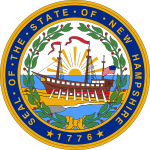| |||||||||||||||||||||||||||||||||||||
All 24 seats in the New Hampshire Senate 13 seats needed for a majority | |||||||||||||||||||||||||||||||||||||
|---|---|---|---|---|---|---|---|---|---|---|---|---|---|---|---|---|---|---|---|---|---|---|---|---|---|---|---|---|---|---|---|---|---|---|---|---|---|
| |||||||||||||||||||||||||||||||||||||
 Results: Republican gain Democratic gain Republican hold Democratic hold | |||||||||||||||||||||||||||||||||||||
| |||||||||||||||||||||||||||||||||||||
| Elections in New Hampshire |
|---|
 |
The 2016 New Hampshire Senate election was held on November 8, 2016, concurrently with the elections for the New Hampshire House of Representatives, to elect members to the 165th New Hampshire General Court. All 24 seats in the New Hampshire Senate were up for election. It resulted in Republicains maintaining control of both chambers of the New Hampshire General Court.
Contents
In addition, Republican Chris Sununu won the open 2016 New Hampshire gubernatorial election giving the New Hampshire Republican Party total control of the state government for the first time since Republican governor Craig Benson was defeated by Democrat John Lynch in the 2004 New Hampshire gubernatorial election. Furthermore, Democratic nominee Hillary Clinton was able to win the state in 2016 Presidential election by fewer than 3,000 votes (0.4%) and Democrat Maggie Hassan won 2016 United States Senate election by around 1,000 votes (0.2%).
Primary elections were held on September 13, 2016.

